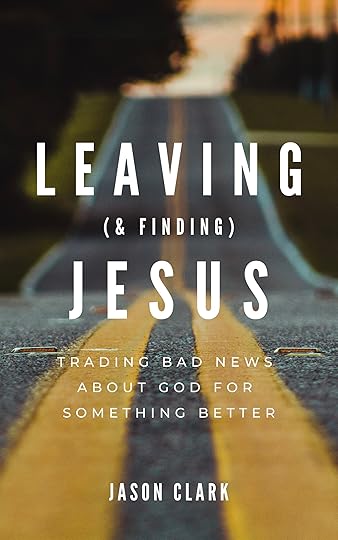I May Be A Better Atheist Than You…
I was corresponding with a new atheist friend the other day. He had read an article where I described God’s goodness with deep affection. He was agitated and looking for a fight, in my direction.
He reached out and let me know how devoted he was to exposing the cruelties, abuses, and hypocrisies of the god he had been raised to believe in; a god to whom he had given zealous devotion and unwavering obedience during his formative and early adult years.
He was angry; and came at me verbally swinging with his beliefs about a retributive, unjust, merciless, unkind, angry, petty, insecure, egomaniac god. He wrote well to expose the horrific nature of the god he once dedicated his life to.
And when he was done, he demanded that I defend the god he no longer believed in.
He wanted a fight.
But there were two problems. First, I didn’t want to fight.
Second, and more importantly, I don’t believe in that god either.
I wrote, “There were days in my life where I tried to believe in the god you just described. It led to desperation, insecurity and a whole lotta shame. But I left that god a long time ago. I don’t believe in or follow him anymore, not even a little. So, no need to argue my friend, we are in agreement, that god sucks.”
I had hoped he would let it go or maybe ask for further explanation, but he was still too worked up with my article in which I wrote about a kind and loving God who happened to go by the same name as the evil god he once believed in and followed.
Instead of engaging in dialogue, he continued to vent.
Ignoring my response, he instead listed several abuses perpetrated by god’s people, the church, throughout history. It was clear he had spent a great deal of time studying and contemplating these horrific hypocrisies, the destruction done in the name of the god he no longer believed in. Then, he again demanded I defend this god, but this time he also wanted me to defend the broken actions of this god’s followers.
But I too am offended and I let him know. “Man, I agree with you. Horrific things have been done on behalf of a god neither one of us believe in or follow. Slavery, sexism, abuses of every kind have been, and continue to be, done in the name of a god we’ve both rejected. But I am not writing about that god.”
He was still not ready to have a conversation, instead, one last time, he unburdened himself with another list of retributive definitions of god and the evil atrocities done by and for him. And again he demanded I defend them.
So, I took a different approach.
“It feels like you keep asking me to defend a god neither of us believe in or follow? We’re in full agreement, believing in that god is detrimental to our emotional, mental, physical, spiritual, and relational health. And submitting to those who follow such a god is signing up for abuse, manipulation, trauma, and loads of behavior-focused shame. I don’t believe in that god, not even a little. I left him a long time ago.”
“But you still consider yourself a Christian!” He responded with frustration.
“Yes, but not as you define it.” Then I added, “I am absolutely in love with God, just not the one you’re angry at. Man, when it comes to that god, I may be a better atheist than you.”
“What do you mean?” He asked. And I sensed he was sincerely asking.
“I think we are in agreement about much, but there seems to be a difference between us, the god we don’t believe in anymore isn’t still haunting me. I no longer lose peace because of him; I have truly left him”
I continued.
“For the sake of conversation, let’s step away from the version of the Christian god you keep associating me with, and let’s instead just describe God as love; a kind, self-giving, others-centered love. From now on, when you read something I write, know that’s the God I am writing about. To me, God is love. Period. And everything is defined through and by this love.”
Everything in our conversation shifted after that, he let me know he could get on board with that God. And then he thanked me.
He thanked me.
And it got me thinking. My atheist friend is convinced of the retributive nature of god. He is even more convinced than many of my Christian friends who continue to play a role in convincing him. And his conviction that god is retributive is destroying his heart even as he pursues atheism as a way to protect it. It seems that even if you reject the existence of god but do not leave the idea that he is retributive, you still experience the bondage of that religion…
But thankfully, God is love and He continues to reconcile the world to Himself…
Some of this article is excerpted from my forthcoming book, Leaving (& Finding) Jesus
CLICK HERE to Pre-Order

 Jason Clark is a bestselling storyteller who writes to reveal the transforming kindness of the love of God in a world traumatized by the religious abuses done in the name of the love of God. He and his wife, Karen, live in North Carolina with their three children, Madeleine, Ethan, and Eva. FollowFollowFollowFollowFollowFollowFollowFollow JOIN OUR MAILING LIST GIVE TO A FAMILY STORY YOU ALSO MIGHT LIKE… God And The Polar Express
Jason Clark is a bestselling storyteller who writes to reveal the transforming kindness of the love of God in a world traumatized by the religious abuses done in the name of the love of God. He and his wife, Karen, live in North Carolina with their three children, Madeleine, Ethan, and Eva. FollowFollowFollowFollowFollowFollowFollowFollow JOIN OUR MAILING LIST GIVE TO A FAMILY STORY YOU ALSO MIGHT LIKE… God And The Polar Express by Jason Clark | December 20, 2018 | Art, Articles, Faith, Short Story | 6 Comments
It’s Christmas Eve and instead of dreaming of the best day of the year, the boy is in his bedroom agonizing over the universal question: Does God—sorry, I mean Santa Clause—really exist? He used to believe, but now…
Read More Seen and Knownby Hope Wiles | December 18, 2019 | Articles, Faith, God Is Not In Control, Life, The Fathers Love | 4 Comments
Sometimes He speaks when it’s quiet, and sometimes when its loud. Sometimes it’s inconvenient. Right in the middle of Walmart close to Christmas. Listen. Listen. Don’t miss the chance to connect with His heart. He invites us in. He invites us to not just know Him, but to have an experience of love as we follow through.
Read More The Most Accepted Heresy on the Planetby Jason Clark | November 4, 2020 | Articles, Faith, Popular, Prone To Love, The Fathers Love | 6 Comments
The idea that God rejects, abandons, or turns away is the most accepted heresy on the planet.
Read More God Is Not In Control, You Are…by Jason Clark | May 29, 2019 | Articles, Crisis of Identity, Faith, God Is Not In Control, Intimacy, Leadership, Life, Parenting, The Fathers Love | 8 Comments
“You know, I could control you, Ethan. I could force, manipulate or straight up shame you into obedience, you’re only ten. I can make him behave. But someday my boy, you will be a man and beyond my ability to control. But more importantly son, I don’t want to control you, I want you to control yourself. I want you to value freedom as the Holy Spirit does. Do you understand?”
Read More What Am I Still Lacking?by Jason Clark | October 20, 2021 | Articles, Crisis of Identity, Faith, God Is Not In Control, Intimacy, Leadership | 0 Comments
The young fella replied, “All these I have kept; what am I still lacking?”…“What am I still lacking? It’s a good question, a recognition that something is missing, an acknowledgment that something still doesn’t measure up, a confession of incompleteness. What am I still lacking? is the conclusion of living in the context of law instead of grace. What am I still lacking? is the beginning and end of every transactional approach to God.
Read More A Sling and A Song: Worship that Kills Giantsby Jason Clark | November 21, 2008 | Art, Articles, Faith, Leadership, Music, Untamed | 0 Comments
Everything in the Kingdom of God is birthed out of worship. All of our promises are engaged through worship. Our worship is an act of surrender, our will for His. But our worship doesn’t stop at surrender. When we surrender to God, He invites us into the untamed where we can demonstrate our worship
Read MoreThe post JAMIE & DONNA WINSHIP / OUR TRUE IDENTITY appeared first on A Family Story.



